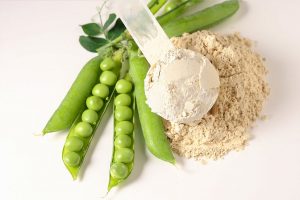In the food and beverage industry, proteins serve various functional roles beyond their nutritional value. They contribute to the texture, mouthfeel and structural integrity of foods while also enhancing flavor and supporting product stability. As such, proteins are a key focus for food manufacturers seeking to create nutritious, appealing and innovative food and beverage products.
From a food science perspective, proteins are vital macronutrients composed of long chains of amino acids. These amino acids serve as the building blocks for various structures within the human body, including muscles, tissues, enzymes and hormones.
The nine essential amino acids are:
- Histidine
- Isoleucine
- Leucine
- Lysine
- Methionine
- Phenylalanine
- Threonine
- Tryptophan
- Valine
Proteins play critical roles in virtually every aspect of bodily function and health. For example:
- Proteins build and repair tissues
- Proteins are essential for metabolic processes
- Proteins are hormones and signaling molecules
- Proteins improve our immune system
- Proteins improve the body’s transportation of oxygen and storage of nutrients
- Proteins maintain fluid balance
- Proteins regulate the body’s pH
- Proteins are responsible for muscle contractions and movement
Because the body cannot synthesize all the necessary amino acids required for protein synthesis, it relies on dietary sources to obtain essential amino acids. Thus, consuming an adequate amount of protein is vital for overall health, growth, development and maintenance of bodily functions.
The recommended daily intake of protein for humans varies depending on factors such as age, sex, body weight, level of physical activity and overall health status. According to the Dietary Guidelines for Americans, which are established by the U.S. Department of Agriculture (USDA) and the Department of Health and Human Services (HHS), the Recommended Dietary Allowance (RDA) for protein for adults is 0.36 grams of protein per pound of body weight per day. This means that a sedentary adult weighing 150 pounds would require about 55 grams of protein per day.
It’s important to note that these are general recommendations, and individual protein needs may vary. Athletes, individuals recovering from illness or injury, pregnant or lactating women and older adults have higher protein requirements.
Additionally, the distribution of protein intake throughout the day is also important for optimizing muscle protein synthesis and overall health. It’s often recommended to evenly distribute protein intake across meals and snacks rather than consuming a large amount of protein in one meal.
Want more information on proteins in food and beverage product development? Contact our SolvPro® team for plant protein questions, or our DairyPro experts for information on dairy proteins.




